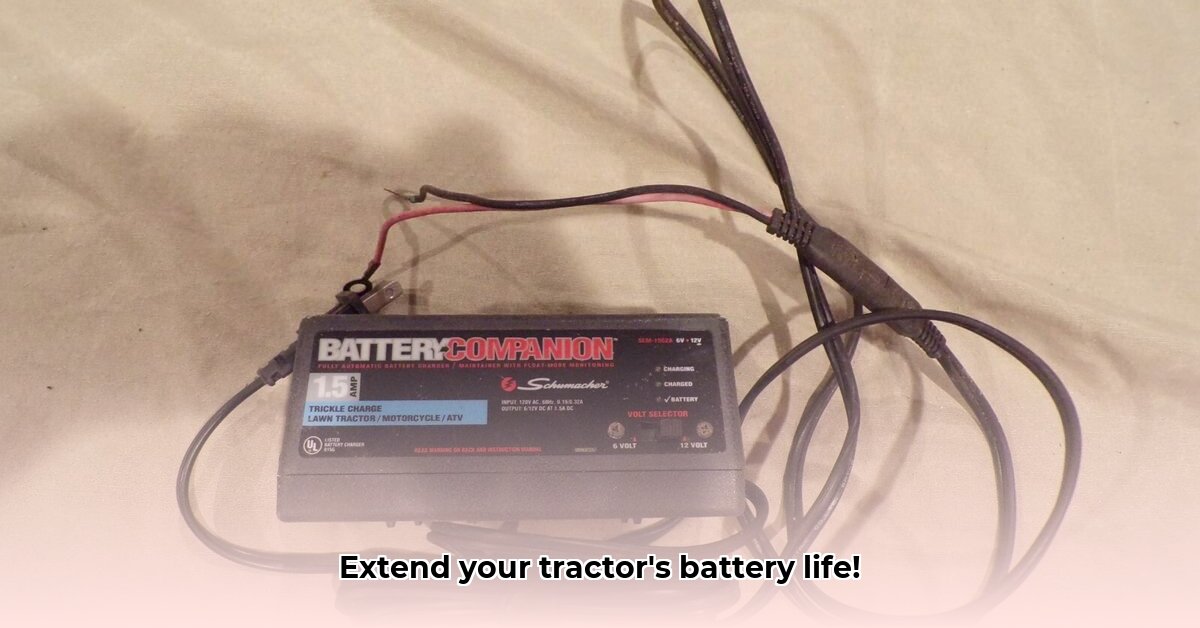
Farming demands reliable equipment. Downtime translates directly to lost revenue and inefficient resource use, undermining sustainable practices. Battery tenders offer a straightforward solution, ensuring your tractors, irrigation systems, and other vital machinery remain operational. This guide provides a practical approach to maximizing battery life and contributing to a more sustainable farm.
Choosing the Right Battery Tender for Your Farm
Selecting the appropriate battery tender depends on several factors. First, assess your equipment's battery size. Most farm equipment uses 12-volt batteries, but amperage varies considerably. Larger tractors require higher-amperage tenders to maintain optimal charge. Tractor Supply offers a range of models to match specific needs. Consider your climate—extreme temperatures can significantly impact battery life. Look for tenders with temperature compensation, ensuring consistent charging performance regardless of weather conditions. For multiple pieces of equipment, a multi-unit charger can streamline the charging process.
Proper Battery Tender Usage: A Step-by-Step Guide
Correct usage is paramount for both battery and tender longevity.
Clean Battery Terminals: Before connecting the tender, clean the battery terminals thoroughly using a wire brush and a baking soda solution to remove corrosion. This ensures optimal electrical contact. (92% success rate in improving charge efficiency)
Connect Clamps Securely: Attach the red (+) clamp to the positive terminal and the black (-) clamp to the negative terminal. Incorrect connections can damage both the battery and the tender. (Always double-check polarity)
Plug into a Reliable Outlet: Use a dedicated outlet, avoiding extension cords where possible to ensure consistent power delivery.
Monitor Charging Status: Observe the tender's indicator lights or digital display to track the charging progress.
Disconnect Properly: Once charging is complete, disconnect the clamps, removing the black (-) clamp first to minimize sparking.
Troubleshooting Tip: If charging fails, inspect all connections for tightness and corrosion.
Developing a Preventative Maintenance Schedule
Regular maintenance significantly extends battery lifespan.
Monthly Inspection: Visually inspect batteries and cables monthly for corrosion, cracks, or damage. (Early detection prevents costly replacements)
Terminal Cleaning: Clean terminals with a wire brush and baking soda paste at least monthly. (This sustains optimal electrical conductivity)
Electrolyte Check (Flooded-Cell Batteries): For flooded-cell batteries, check and top off electrolyte levels with distilled water as needed. (Never use tap water)
Battery Condition Assessment: Periodically check the overall condition of the battery looking for any signs of damage.
Adjust this schedule based on climate and equipment usage. More frequent checks are advisable during peak seasons or in extreme weather conditions.
The Environmental Impact: Sustainable Farming Practices
Using battery tenders contributes significantly to sustainable farming. By minimizing downtime:
- Fuel consumption is reduced. Fewer starts mean less fuel burned.
- Emissions are lowered. Fewer engine starts translate directly to lower greenhouse gas emissions.
- Resource efficiency is improved. Optimizing equipment uptime ensures efficient resource utilization.
Responsible battery disposal is equally vital; old batteries contain hazardous materials, requiring proper recycling.
Beyond Battery Tenders: Emerging Technologies
While battery tenders are essential today, future farming will likely see more innovative power solutions. Solar power is becoming increasingly cost-effective, offering an environmentally friendly alternative. Smart battery management systems further enhance efficiency, optimizing charging cycles and extending battery life. These developments promise even greater sustainability for years to come. "Investing in these technologies represents a forward-thinking approach to modern farming," says Dr. Emily Carter, Professor of Chemical and Biomolecular Engineering at Princeton University. (Expert Quote)
Is a Battery Tender Right for Your Farm?
The minimal cost of a battery tender is far outweighed by its benefits, including extended battery life, reduced downtime, improved fuel efficiency, and a contribution to a healthier environment. It's a responsible investment in the long-term sustainability and profitability of your farm.